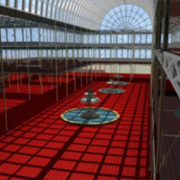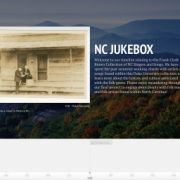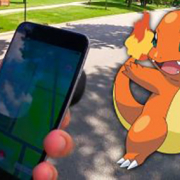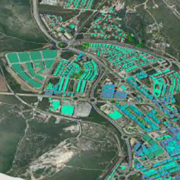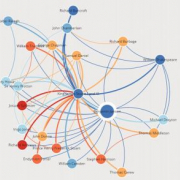One of the goals of the Digital Humanities Initiative is to grow the Duke communities of faculty, students, and staff that are developing on Duke's campus around some aspect of digital humanities. By organizing the field into these community topics and connecting them to representative projects, workshops, and other resources on campus, the DHI supports those looking to get involved with some aspect of the DH at their own pace.
Concept: Scanning and Modeling real and imagined dimensional objects and environments for critical, historical, and creative purposes. This includes both 3D imaging from photos, lasers, and other tools and drawing in 3D software environments. Some 3D Models are also printed out as material objects.The Digital Art History & Visual Culture Research Lab,… read more » about 3D Modeling / Visualization
Concept: Using web technologies to make digital objects publicly accessible on the internet. These digital objects may include, but are not limited to, text, images, audio, and video. Oftentimes, digital collections will organize digital objects in a way to make they more accessible and discoverable for researchers, whether by creating exhibits, facets, or search features.… read more » about Archives and Digital Publishing
Concept: Data visualization encompasses a wide range of practices focused on the transformation of quantitative or otherwise segmented information into visual forms to convey information and sometimes provide interactive engagement with data sources. This topic also includes the creation of data itself, and histories and theories of information processing. The Duke Libraries Data and… read more » about Data Visualization
This theme focuses on the range of approaches to creating narrative and interactive experiences using digital tools and hybrid media systems. The emphasis is on approaches that take advantage of computational media affordances for construction and playback. This topic also includes exhibition design with significant digital and interactive components. Common toolsets include the… read more » about Digital Storytelling and Exhibitions
Concept: Using simulated spaces, virtual worlds, and hybrid media annotation systems to reconstruct sites, explore counterfactual concepts, and offer contextualized/situated knowledge. Procedural and interactive environments for experience design, storytelling, activism, and entertainment.Some of the places where extended reality (virtual, mixed, augmented) and games are happening… read more » about Extended Reality and Games
Concept: Applying geospatial information system tools and techniques to common objects of study in the Humanities. Work in this area spans a wide spectrum, from giving audiences a different view of history by overlaying historical and modern maps or showing change in a place over time or how ideas… read more » about Mapping/GIS
Concept: Exploring relationships and connections between objects commonly studied in the Humanities. This process involves breaking information into component parts and visualizing those parts to show their interdependence. Examples of Humanities networks might be: philosophers and how they borrow philosophical concepts or artists and the museums their works are displayed in. Some of the places… read more » about Networks
Concept: Applying project management principles and best practices to digital projects in the Humanities. This includes learning about: project planning, collaboration, data storage, and tools for being more efficient in your project management.Some of the places where project management learning is happening at Duke include: … read more » about Project Management
Concept: Using social media or crowdsourcing to collect information from past or present events to make that history or the objects that make up that history more accessible for research or public consumption.Some of the places where social media and crowdsourcing are being utilized are: Forum for Scholars and Public, the … read more » about Social Media and Crowdsourcing
Concept: Projects related to the making and unmaking of sound. Sound Studies is an emerging interdisciplinary field that explores the idea of sound from cultural, aesthetic, and scientific perspectives. it also considers technologies of reproduction and circulation. The Department of Music is a primary site for the study and creation of music, both traditional and conceptual, and… read more » about Sound
Concept: Using technology hardware and software to convert, explore, and visualize common Humanities text-based information. This area includes text analysis, topic modeling, statistics, and various quantitative methods of exploring text-based information.Some of the places where text scholarship is happening at Duke include: Data and… read more » about Text
Although taken up by many communities, "Digital Humanities" is a complicated and sometimes contested term. Theorists, practitioners, and critics have weighed in on the question of what is included and not included in that definition. Is the digital a modifier of humanities practice as it has been understood within existing disciplines? Is it inherently distinct? Is it is a set of tools and… read more » about Theoretical and Critical Approaches
